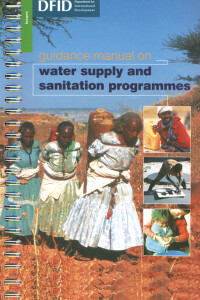-
The software of emergency water supplies
01.04.1988
-
Effective environmental education — constraints and prerequisites
01.10.1994
Unlike many of their elders, the young find it easy to grasp that nature must be cherished — not plundered. If environmental education programmes are going to be effective, each section of the community must be targeted with an appropriate message firmly rooted in the local context. -
Pollution from on-site sanitation - the risks? What risks?
01.04.1999
Just how does the threat of groundwater pollution compare to the risks to health posed by an absence of sanitation systems? -
Evolution in engineering – the survival of the fitter
01.06.1990
The motor mechanics or 'fitters' of Ghana display great ingenuity repairing old vehicles but are often limited by the tools and equipment at their disposal. This article describes the work of the Intermediate Technology Transfer Unit in Suame Magazine, Kumasi, where fitters can come and learn engineering techniques and purchase more advanced workshop machinery, so as to equip them to manufacture a wider range of products. -
Kumasi University's involvement in grassroots industrial development
01.06.1991
This article describes the twenty-year-long collaboration between academics and artisans in the Technology Consultancy Centre at Kumasi in Ghana. What began as a small campus-based consultancy group grew into a workshop and training centre at the heart of the informal sector area of Suame Magazine and is now spreading into all of Ghana's ten regions as Intermediate Technology Transfer Units. The growth of institutions has been matched by a change among the artisans from a concentration on repair work to a growing number of manufacturing engineering businesses. These businesses now produce machinery and wood-working equipment which was previously imported, often at high cost, and for which there is a considerable and expanding demand. -
Behavioural determinants associated with E. coli contamination post-treatment in households that practise water treatment in rural Cambodia
01.04.2017
In this study, we examined behavioural determinants associated with Escherichia coli contamination of drinking water between the point of treatment (PoT) and the point of consumption (PoC) within households (HHs) that were practising household water treatment (HWT) or purchased 20 L bottles of treated water in rural Cambodia. We measured E. coli levels at both the PoT and PoC in 399 HHs in 32 villages in four provinces. The Health Belief Model and the Theory of Reasoned Action guided eight behavioural determinants theorized to be associated with the E. coli contamination. Multivariate analysis was used to build models predicting the E. coli contamination between the PoT and PoC in the HH setting. Behavioural determinants associated with the recontamination of treated drinking water included: perceived susceptibility of treated water to contamination and perception of divine will as a cause of diarrhoea. The perceived susceptibility of treated water to be contaminated was also significantly associated with actual drinking water handling behaviours and practices adopted within HHs, such as how often the drinking vessels are cleaned. We conclude that understanding the behavioural determinants that are associated with the E. coli recontamination between PoT and PoC in the treated drinking water will inform interventions aimed at changing HH behaviours and improving the impact of adopting HWT. -
Process learning on partnerships: building functioning research and practice organizational relationships
01.01.2019
Implementers and researchers are responding to increasingly strong incentives to work together closely. Donors are placing a higher value on data, rigour, and evidence of impact from development assistance projects. This is seen in policy debates emphasizing value for money, and funding contingent on results and performance. In response, implementing organizations are increasingly collaborating with researchers. Such arrangements incur costs (financial and other), but the return on investment is high. Investments in relationship building, open and frequent communications, a clear understanding of partners’ objectives and non-negotiable requirements, and a mind-set of problem solving are important priorities in setting productive implementation science partnerships. We document process learning from developing a partnership between an implementing organization, Plan International, and a research institute, the Water Institute at the University of North Carolina. We make the case that: effective partnerships have preconditions for success; building institutional respect takes time and incremental changes to business as usual; establishing a partnership early with a long start-up period is advisable; accountability and research relevancy increase through shared roles during project design and results interpretation; and research message development requires regular review meetings with increasing frequency toward the end of a project.

